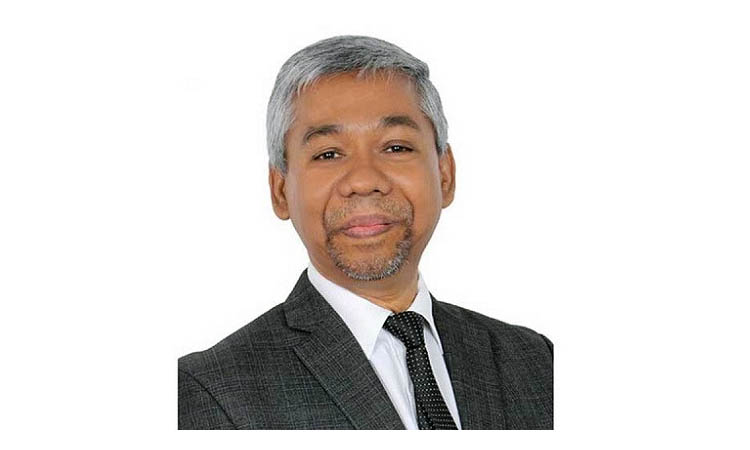News Flash

DHAKA, May 4, 2025 (BSS) – National Board of Revenue (NBR) Chairman Md Abdur Rahman Khan today said the government has been trying its best to simplify the processes of cost of compliance in income tax, customs and VAT.
“In this budget, we’re trying our best to simplify the processes that can facilitate the business people …We’re trying our best to simplify the processes of cost of compliance in income tax, customs and VAT especially in tax and VAT laws as well as the tax revenues do not reduce. So, this is our first focus,” he said.
Rahman also said that when the budget for the next fiscal year (FY26) would be declared, a lot of such kind of simplification procedures would be found in the fresh Finance Ordinance.
The NBR Chairman was addressing a seminar titled “Fiscal Issues for National Budget 2025-26 to Foster Economic and Business Growth” as the chief guest held at a hotel in the capital today.
The Institute of Chartered Accountants of Bangladesh (ICAB), in collaboration with the Foreign Investors' Chamber of Commerce & Industry (FICCI) and the Japan-Bangladesh Chamber of Commerce & Industry (JBCCI), jointly organized the seminar.
ICAB’s council member and former President Mohammed Humayun Kabir chaired the session. The seminar featured insightful keynote presentations from Dr. M Masrur Reaz, Chairman of Policy Exchange Bangladesh, and Snehasish Barua, Partner at Snehasish Mahmud & Co., Chartered Accountants.
The seminar also featured an engaging panel discussion with industry leaders, including Mohammad Iqbal Chowdhury, CEO of Lafarge Holcim Bangladesh Limited; Manabu Sugawara, Country Head of Bangladesh at Marubeni Corporation; Yuji Ando, Joint Secretary General of JBCCI; Dr. Abdul Mannan Shikder, Former Member of NBR; and Md. Afzal Hossain, former Secretary to the Government.
The NBR Chairman said that the government would be doing rationalization of the tax structure although it might not be up to the expectations of the business community.
“But, you will get the message that the government pays heed to your complaints and issues and we’re sympathetic and empathetic to your causes,” he added.
Referring to his pre-budget parleys over the last two to three months with the representatives and leaders from various sectors, the NBR Chairman said that most of their demands were related to the reduction of the tax rates although their demands were not unjustifiable in many cases.
“But, as a chairman of the revenue board, it is very difficult for me to strike a balance between the increasing revenue and facilitating trade and business,” Rahman said.
He said despite Bangladesh offering one of the lowest nominal corporate tax rates in the region at 22.5 percent, the effective burden remains high due to arbitrary assessments.
To address this, he said the NBR would roll out monitoring tools to evaluate tax assessment quality.
“We’ll track all assessments and reward officials based on merit and adherence to rules,” he said, adding that this would limit discretion and build taxpayer confidence.
Mentioning that the efforts to tackle tax evasion are also underway, Rahman said the NBR has started sending notices to non-filers, and each tax office would be given recovery targets.
The NBR Chairman said his revenue board is considering the introduction of a long-term tax policy framework to reduce abrupt changes.
He said that a new online export-import tax portal has been launched to improve transparency.
Stating that the manual audit selection has been paused, Rahman said they would begin with random electronic audits of 0.5 percent of returns while the figure would grow as digital systems mature.
ICAB President Maria Howlader emphasized the need for predictable tax policies, digitalization, and structural reforms to create a more business-friendly environment.
She highlighted controlling of inflation, enhancing revenue mobilization and promoting sustainable investment. “We need to set a predictable tax policy and ensure consistency,” she added.
Maria called for a clear pathway to ensure discipline in revenue management and public expenditure.
She also said, Bangladesh’s economy, like many others, continues to be influenced by global price fluctuations and political developments.
Since domestically inflation remains a major concern with general inflation rates persisting at around 9–10%, the ICAB president said to address inflation effectively, it is essential to ensure better coordination between fiscal and monetary policies.
“Unchecked fiscal deficits and excessive government borrowing can intensify inflationary pressures, ultimately threatening overall economic stability,” she observed.
She urged policymakers to focus not just on revenue collection but also on trade facilitation, advocating for automation, institutional coordination, and policy stability to restore investors’ confidence.
FICCI President Zaved Akhtar emphasized the need for an integrated tax system to enhance revenue collection while ensuring transparency and efficiency.
He stressed the importance of distinguishing policy formulation from revenue administration to foster fairness and predictability.
Zaved also advocated for a unified VAT rate, proper classification of raw materials, and the gradual removal of non-tariff barriers to strengthen Bangladesh’s trade competitiveness amid its upcoming LDC graduation.
JBCCI President Tareq Rafi Bhuiyan (Jun) welcomed the upcoming budget’s focus on improving ease of business, highlighting its potential to attract investment and foster stronger Bangladesh-Japan economic ties.
Dr. M Masrur Reaz highlighted the formidable challenges facing Bangladesh’s economy, emphasizing that its resilience is being tested amid global economic uncertainty. “With inflation hovering near double digits and foreign direct investment at a six-year low, Bangladesh must take decisive fiscal and monetary action to navigate these headwinds,” he remarked.
Echoing these concerns, Snehasish Barua stressed the need for bold fiscal policies in the upcoming budget.
The seminar was attended by key stakeholders, including Shubhashish Bose, CEO of ICAB; members of the FICCI Board of Directors; FICCI Executive Director TIM Nurul Kabir; Tahera Ahsan, Executive Director of JBCCI; as well as representatives from various embassies, member companies of FICCI and JBCCI, and other stakeholders.